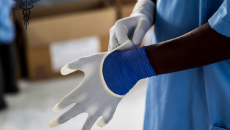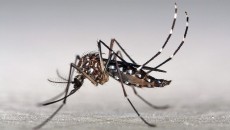CHICAGO, USA – In July, a team of medical professionals and humanitarians transported over US$700,000 worth of medical supplies to hospitals in Liberia such as the John F. Kennedy Memorial, Phebe, and Redemption, and Ganta United Methodist Hospitals. They plan to return in December to provide training for using and maintaining the equipment.
Rev. Kenety Gee, President of the Chicago Global Health Alliance and formerly featured as a Liberian Trailblazer by The Bush Chicken, led the trip. Gee described the experience as rewarding and said the Liberian government and the medical community were receptive to the program.
“I was able to meet with several government representatives including the new Minister of Health, also the Chief Medical Officer for the country and the Chief Medical Officer for JFK Hospital,†he said.
In his encounters with the healthcare community in Liberia, Gee said he was most interested in “how to create a robust, sustainable healthcare system in a developing economy.†He wanted to make sure that CGHA’s contributions could complement existing work instead of interrupting it.
“These are the questions we’re in the process of answering [in order] to develop a long lasting, sustainable partnership with the government,†Gee added.
Training Staff to Maintain and Operate Equipment
Now that the biomedical equipment is in Liberia, the CGHA team wants to ensure that there are trained Liberians who can operate and maintain the equipment. To facilitate this, Gee and his team are planning another trip to Liberia to implement the second phase of the program, along with other training programs.
In December 2015, a volunteer team of medical professionals will return to Liberia to conduct training for the use and repair of the biomedical equipment. Gee said the organization is partnering with the Booker Washington Institute in Kakata to establish a biomedical training facility on its campus shortly.
This would be the first such training center in Liberia. “The health community was very excited about this also because this is not only something that is missing for that location but the entire region,†Gee said of the training partnership. Such a training facility would help to “avoid any lengthy disruptions in providing care.â€
Lack of Equipment in Liberian Hospitals
One of those professionals who will be providing training during the December trip is Dr. Adam Murphy, who is a co-founder and Board President of CGHA. He is also on the faculty at Northwestern University in the Department of Urology and in the Center for Global Health.
Gee first asked Murphy to go on a medical mission to Liberia in 2012. The trip was planned for him to teach doctors about modern prostate cancer care, conduct screenings, and to explore starting a research program in Liberia.
Familiar with health statistics in the US that shows that men of African descent die from prostate cancer more often than others, Murphy was surprised to learn that health professionals in Liberia did not consider prostate cancer a priority. “The life expectancy for men in Liberia wasn’t [high] enough to really make it a major medical issue,†he said.
Even more striking to him was that the lack of equipment would prove to be a major hindrance. “I had a series of lectures planned around urinary tract infections, kidney stones, prostatic enlargement and all of it was predicated on the equipment we have in the states,†Murphy said.
“The lack of diagnostic equipment made me realize that I completely failed to prepare for the context properly and that I had to adjust everything I planned to do based on the context.â€
Murphy described encountering scenes at medical facilities that were shocking to him:
“When we took tours of the hospital, and I did rounds, I couldn’t find sinks to wash my hands in between patients. I saw a woman who died on the stretcher delivering a baby because they couldn’t get her to the operating room to perform a C-section. There was only one operating room that was functioning because they were missing anesthetic gas.
When you see situations like that happening it shifts your priorities a little. I work in a world class hospital that has an abundance of supplies but when I got to Liberia, things that I assumed would be happening or should happen were not. Basic needs, like hand washing supplies, gauze, dressing materials, face masks – things that were easily fixable – were just not there. That experience was what prompted the idea that we would provide medical equipment first.â€
It was on that trip that the CGHA team collected lists of supplies from the chief medical officers of the four hospitals. They then partnered with Project Cure, which bills itself as “the largest provider of donated medical supplies and equipment to developing countries around the world.†Murphy said this was crucial for their work to continue. “We had to have this piece in place if I was to go back in the future and be able to provide surgical care and the local medical team providing post-surgical care.â€
Addressing Mental Health
Another gap in the health sector that CGHA is attempting to fill relates to mental health. Although there were individuals with few months of training to provide some mental health support, the team found that the mental health sector was not robust enough to provide support to a post-war population.
Liberia has only two practicing psychiatrists in the country and less than 20 psychologists, according to Dr. Williametta Simmons, a Liberian psychologist, who presented those figures at a conference in Washington, DC in April 2015. There is also only one inpatient mental health facility with less than 100 beds in Liberia. This is the case even though approximately 44% of the population are suffering from post-traumatic stress disorder or major depressive disorders from the effects of the war.
Dr. Nataka Moore, who is another co-founder of CGHA and the Director of Population Mental Health, said those statistics, coupled with the effects of the Ebola outbreak “exacerbate an already stressed population.â€
“When you have communities where there is a lot of issues including unemployment, physical health concerns, and lack of education, there can be a lot of unhealthy behaviors people engage in that can impact their wellbeing and the wellbeing of the community around them,†Moore said.
“There are likely many other issues tied to that particular problem, including substance abuse, unsafe sex, sexual abuse, criminal behavior and a large part of why we’re going is to identify the best way to help address the needs of the community.â€
Moore is leading several mental health initiatives in Chicago and has led programming in under-served communities for the promotion of healthy behaviors for CGHA.
“Going into [Liberia] as a psychologist is a little different than going as a physician,†she said. “There are cultural contexts that you have to be mindful of even more as a psychologist. What mental health means and how people begin to tackle and handle that is so different from culture to culture.â€
Moore said even in the US, certain ethnicities respond differently to mental health treatment. “So to really be socially responsible, what we’re planning to do initially is to determine how people contextualize mental health and what that word means to them.â€
In her practice among African-Americans in the US, Moore says she even avoids the phrase “mental health†and uses “stress†instead.
She added, “Understanding how people utilize community is important to determine how to use community-based programs for interventions. So when we go in December, our primary goal is to partner, do a needs assessment and to communicate on what the best first steps would be.â€
Broader Partnerships with World-Renown Medical Institutions
Beyond the trip in December, CHGA wants to establish broader partnerships with institutions such as the highly ranked Feinberg School of Medicine at Northwestern University in the US state of Illinois.
“We want to develop programs that can support medical professionals in Liberia to further their training and education, specifically higher skilled training,†Gee said. “This is going to be a long-term effort; our entire goal is to make systemic change in the health sector for the country.â€
The biomedical equipment delivery and training projects this year are meant to meet some of the “immediate needs†of the healthcare system. Gee said CGHA’s goal is to build the confidence of Liberians in their country’s healthcare system to avoid having to seek medical attention outside of the country.
According to Murphy, this will mean having “a successful urology program established and to have a system implemented to provide ongoing consultative support to medical hospitals in the country.â€
Additionally, the team also aims to see “a more established mental health program to expand training beyond what The Carter Center, [a humanitarian organization founded by US President Jimmy Carter provides].â€
Even before the proposed partnerships with the medical schools, Murphy said he wants to create a curriculum to train doctors to screen for common urology problems. He wants more difficult diagnoses to be done through electronic consultations through video conferencing and email, a model known as telemedicine.
“We are looking to partner as long-distance consultants once we complete the trainings,†Murphy said.  “In Nigeria and Ghana they have successfully implemented telemedicine in certain facilities. Once the technology is available, we plan on having monthly remote medical consultations with our partner hospitals.â€
Volunteers Needed
Gee knows they cannot accomplish this task on their own. At this moment, he said CGHA needs “skilled volunteers, nurses, and doctors to help with some of the medical volunteer work the doctors will be participating in during our four-week stay in the country.â€
Since part of the trip is planned to focus “more on urology and the aftercare piece of patient care,†Murphy also said he would be most interested in having other urologists join the trip. However, he still welcomes other medical specialists who want to support the project. Ideally, CGHA would like medical staff who can cover their travel expenses but Murphy said the organization would try to raise funds for those who may not have the finances.
“We definitely welcome people interested in supporting the program and would love to hear from them,†Murphy continued. “We do two to three-week rotations, I’ll be there for three weeks in December and I’d like for them to join us on that trip of possible so we can really be effective. If they can only travel for a week, they may not be as effective as they’ll spend most of that time assessing rather than practicing.â€
Moore also emphasized the need for professionals with experience. “If people are interested and feel like they have an area of expertise or that they are passionate about that they want to even join on an advisory level we would love to hear from them,†she said.
“One of my colleagues, Tiffany McDowell, will also be traveling to Liberia in December, which is so helpful because she has a background in marriage and family therapy and is also a community Psychologist,†Moore added. “If there are people that are interested in working together to pass on resources or even provide ideas we welcome their support.â€
The organization is collecting donations at its website. There, interested parties can also find out about the Art Gala, which will be held in Chicago on September 18th. Gee is also expected to run the Chicago and New York Marathons to help raise additional money to use towards travel fees for the volunteers.



